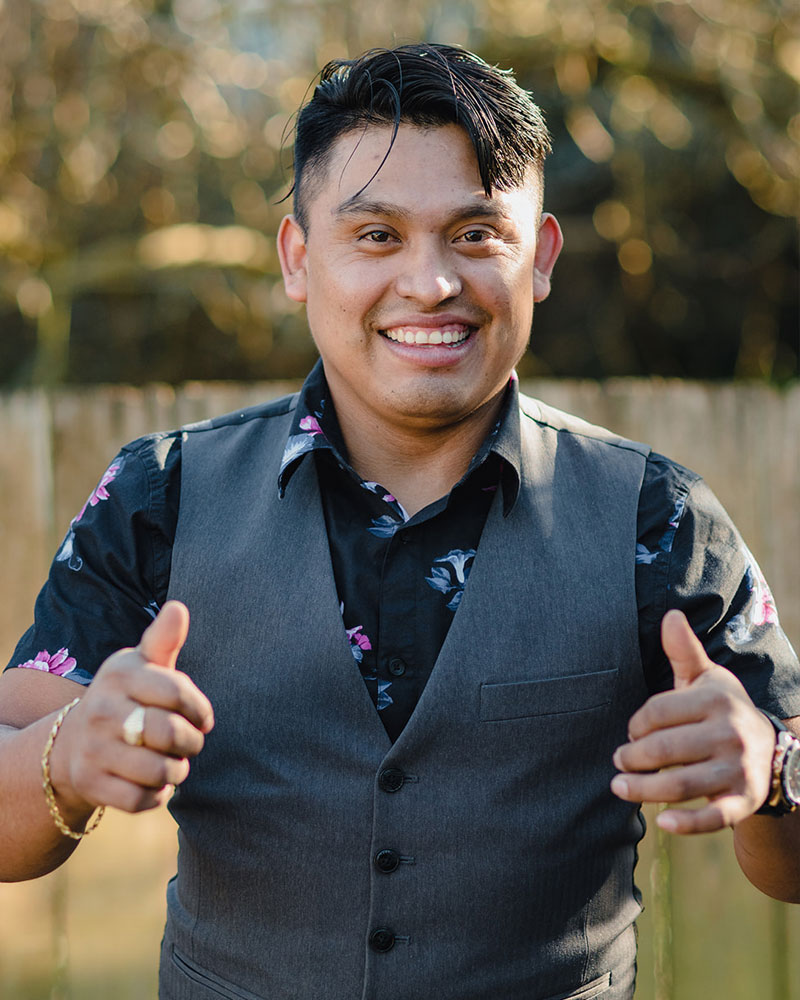Frankling from Nicaragua
Frankling worked in agriculture in Nicaragua until he was seventeen and later in construction or at markets. After the 2006 presidential election of Daniel Ortega, and during his three 5-year terms after that, the political situation changed from support of democratic rights to dictatorial oppression of all classes people.
Frankling worked half the year in Costa Rica, returning to work year-round in Nicaragua in 2014. In 2018, as civil and human rights violations became increasingly severe, retirees, students, teachers, and other groups began to organize anti-government marches. As the government sent troops to quell these peaceful marches, ordinary citizens began to disappear or be killed. Unemployment followed along with strikes and more citizen protests. As a concerned citizen, Frankling joined the strikes and became a political organizer, demanding the government respect human rights and end the murders and disappearances of protestors. He was soon a wanted man, was threatened with prison, and decided to leave Nicaragua. He tried to go to Costa Rica, but the border was closed, so he hid in Managua for a time, without work and afraid to walk the streets. He then decided to go to the United States.
“My heart and soul split open to have to leave my family, it hurt so much, but I had to leave to survive.” Frankling left his country in October 2018, traveling by land across Honduras, El Salvador, and Guatemala to arrive in southern Mexico. While Nicaraguan soldiers were searching for him, he applied for a humanitarian visa with a Mexican immigration agency so he could travel to the US-Mexico border and request US asylum. He needed the visa to avoid arrest in Mexico and deportation to Nicaragua. He traveled to Tijuana where he was interviewed by a US organization to assess his qualifications for US political asylum. This organization gave him number 2,067, which meant he would not be able to claim asylum for more than a year.
“Tijuana is very dangerous. I stayed in a shelter with others from Central America. Untrust-worthy people there approached me claiming to want to help me find a lawyer. Some Narcos approached me; I thought they were going to kidnap me. I realized I could not risk staying at that shelter as a target and decided to make my way to the US border on my own.”
Frankling walked to a border crossing. People there demanded all his money to cross, threatening “either you pay, or we shoot you.” They robbed him of his remaining funds, took his phone, and then took him to a tunnel, where he thought he’d be killed. Once in the tunnel, he heard three gunshots and thought he would die. At 1:00am on December 28, 2019, he was surprised that the tunnel gate opened, and he walked out on the US side. He walked towards San Diego. He was soon met by US border patrol and requested asylum. They took him to a very cold holding cell, gave him very little food, and an aluminum blanket. He had no access to a shower. After 15 days, border patrol transferred Frankling to an Arizona ICE detention center.
“They treated us badly. I was very stressed out and could not talk to my family. I just wanted to talk to someone who could make me feel better. After two days, on February 14, 2019, I was handcuffed and shackled, then flown and driven by ICE to the Tacoma detention center. They gave me a specific place to sleep, an ID card, and I was able to bathe. I was still a prisoner and had no money, so I worked in their kitchen to earn a dollar a day. I used that money to call my family and buy a cup of noodles at the commissary.”
Frankling created a routine to keep himself from getting depressed, knitting six pairs of shoes with yarn donated by AIDNW. After working in the kitchen, he spent an hour exercising, then reading the Bible and attending Christian services on Sundays. ICE told Frankling he needed an attorney to represent him in his asylum case, but he had no idea how to get that help. Through a sign-up sheet in the detention center, an attorney from a local nonprofit, Northwest Immigrant Rights Project, agreed to represent him pro bono in his court hearing. It was successful and a huge relief to be granted US asylum – a doorway to a new life. Frankling was released on April 19, 2019. In light-weight clothing, he walked out to the AIDNW RV.
“I didn’t know how to react, to cry or laugh or yell. It was so overwhelming, it felt like a dream, it was unbelievable. I started to feel peace in my life; all I could do was thank God.”
Frankling was greeted by AIDNW volunteers at the RV Welcome Center outside the detention center release gate. They gave him new clothes, shoes, a backpack, and connected him by phone to his family in Nicaragua, then took him to the AIDNW Hospitality House where he was told he could live, eat, rest, shower, and stay. His family had thought him imprisoned or dead and now there was renewed hope.
“I had no family or anyone to depend on when AIDNW, and then World Relief, supported me 100%. While I stayed and ate at the AIDNW house for several months, World Relief found me an apartment, helped me with English classes, transportation, food, dental care, cultural adjustments, and the documents and permits to work and live here.”
Frankling is now a Green Card US resident only one year after he got asylum. In addition to his full-time job, he is living at the AIDNW Hospitality House as a host coordinator helping other immigrants who stay there. He can empathize with their situations and journeys because of his lived experience.
“I feel privileged to be here and to support and help people through AIDNW’s programs. I have no way of repaying the kindness of AIDNW and World Relief people except to help others who are immigrating. Coming to the US was like being reborn, a new beginning. The generosity of people here surprised me; however, I must say the immigration laws here are cruel, in my opinion. Someday, I would like to have my own business and I want to continue to help others.”





